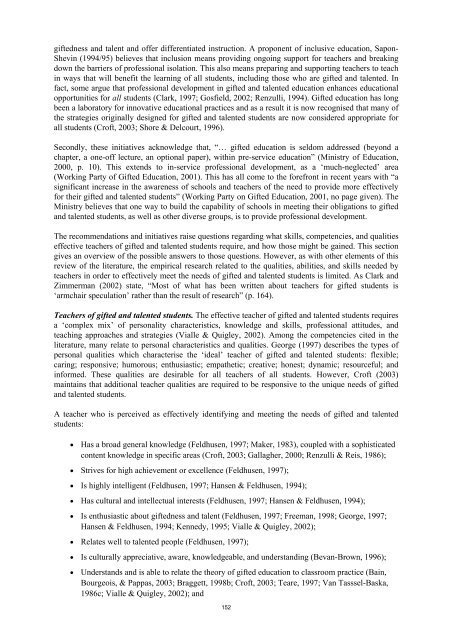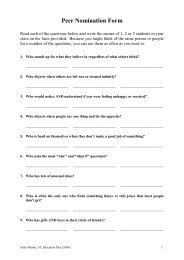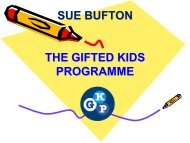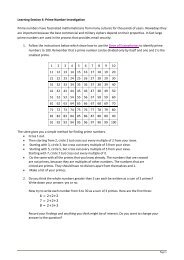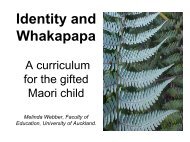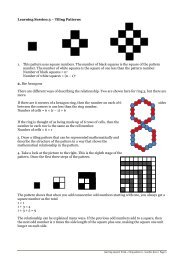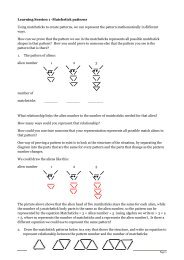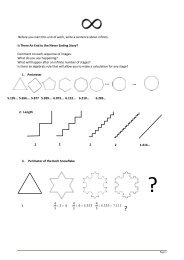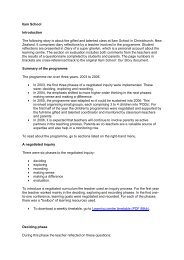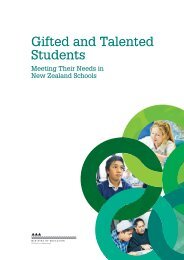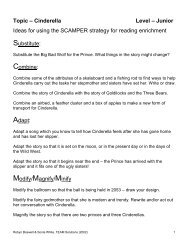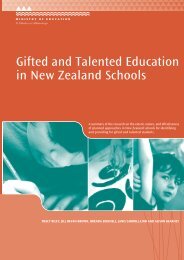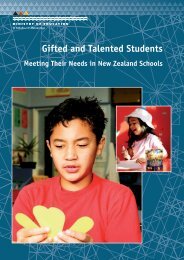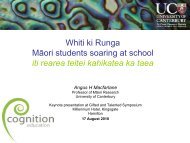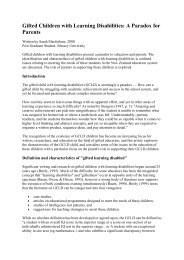The Extent, Nature and Effectiveness of Planned Approaches in ...
The Extent, Nature and Effectiveness of Planned Approaches in ...
The Extent, Nature and Effectiveness of Planned Approaches in ...
You also want an ePaper? Increase the reach of your titles
YUMPU automatically turns print PDFs into web optimized ePapers that Google loves.
giftedness <strong>and</strong> talent <strong>and</strong> <strong>of</strong>fer differentiated <strong>in</strong>struction. A proponent <strong>of</strong> <strong>in</strong>clusive education, Sapon-Shev<strong>in</strong> (1994/95) believes that <strong>in</strong>clusion means provid<strong>in</strong>g ongo<strong>in</strong>g support for teachers <strong>and</strong> break<strong>in</strong>gdown the barriers <strong>of</strong> pr<strong>of</strong>essional isolation. This also means prepar<strong>in</strong>g <strong>and</strong> support<strong>in</strong>g teachers to teach<strong>in</strong> ways that will benefit the learn<strong>in</strong>g <strong>of</strong> all students, <strong>in</strong>clud<strong>in</strong>g those who are gifted <strong>and</strong> talented. Infact, some argue that pr<strong>of</strong>essional development <strong>in</strong> gifted <strong>and</strong> talented education enhances educationalopportunities for all students (Clark, 1997; Gosfield, 2002; Renzulli, 1994). Gifted education has longbeen a laboratory for <strong>in</strong>novative educational practices <strong>and</strong> as a result it is now recognised that many <strong>of</strong>the strategies orig<strong>in</strong>ally designed for gifted <strong>and</strong> talented students are now considered appropriate forall students (Cr<strong>of</strong>t, 2003; Shore & Delcourt, 1996).Secondly, these <strong>in</strong>itiatives acknowledge that, “… gifted education is seldom addressed (beyond achapter, a one-<strong>of</strong>f lecture, an optional paper), with<strong>in</strong> pre-service education” (M<strong>in</strong>istry <strong>of</strong> Education,2000, p. 10). This extends to <strong>in</strong>-service pr<strong>of</strong>essional development, as a ‘much-neglected’ area(Work<strong>in</strong>g Party <strong>of</strong> Gifted Education, 2001). This has all come to the forefront <strong>in</strong> recent years with “asignificant <strong>in</strong>crease <strong>in</strong> the awareness <strong>of</strong> schools <strong>and</strong> teachers <strong>of</strong> the need to provide more effectivelyfor their gifted <strong>and</strong> talented students” (Work<strong>in</strong>g Party on Gifted Education, 2001, no page given). <strong>The</strong>M<strong>in</strong>istry believes that one way to build the capability <strong>of</strong> schools <strong>in</strong> meet<strong>in</strong>g their obligations to gifted<strong>and</strong> talented students, as well as other diverse groups, is to provide pr<strong>of</strong>essional development.<strong>The</strong> recommendations <strong>and</strong> <strong>in</strong>itiatives raise questions regard<strong>in</strong>g what skills, competencies, <strong>and</strong> qualitieseffective teachers <strong>of</strong> gifted <strong>and</strong> talented students require, <strong>and</strong> how those might be ga<strong>in</strong>ed. This sectiongives an overview <strong>of</strong> the possible answers to those questions. However, as with other elements <strong>of</strong> thisreview <strong>of</strong> the literature, the empirical research related to the qualities, abilities, <strong>and</strong> skills needed byteachers <strong>in</strong> order to effectively meet the needs <strong>of</strong> gifted <strong>and</strong> talented students is limited. As Clark <strong>and</strong>Zimmerman (2002) state, “Most <strong>of</strong> what has been written about teachers for gifted students is‘armchair speculation’ rather than the result <strong>of</strong> research” (p. 164).Teachers <strong>of</strong> gifted <strong>and</strong> talented students. <strong>The</strong> effective teacher <strong>of</strong> gifted <strong>and</strong> talented students requiresa ‘complex mix’ <strong>of</strong> personality characteristics, knowledge <strong>and</strong> skills, pr<strong>of</strong>essional attitudes, <strong>and</strong>teach<strong>in</strong>g approaches <strong>and</strong> strategies (Vialle & Quigley, 2002). Among the competencies cited <strong>in</strong> theliterature, many relate to personal characteristics <strong>and</strong> qualities. George (1997) describes the types <strong>of</strong>personal qualities which characterise the ‘ideal’ teacher <strong>of</strong> gifted <strong>and</strong> talented students: flexible;car<strong>in</strong>g; responsive; humorous; enthusiastic; empathetic; creative; honest; dynamic; resourceful; <strong>and</strong><strong>in</strong>formed. <strong>The</strong>se qualities are desirable for all teachers <strong>of</strong> all students. However, Cr<strong>of</strong>t (2003)ma<strong>in</strong>ta<strong>in</strong>s that additional teacher qualities are required to be responsive to the unique needs <strong>of</strong> gifted<strong>and</strong> talented students.A teacher who is perceived as effectively identify<strong>in</strong>g <strong>and</strong> meet<strong>in</strong>g the needs <strong>of</strong> gifted <strong>and</strong> talentedstudents:• Has a broad general knowledge (Feldhusen, 1997; Maker, 1983), coupled with a sophisticatedcontent knowledge <strong>in</strong> specific areas (Cr<strong>of</strong>t, 2003; Gallagher, 2000; Renzulli & Reis, 1986);• Strives for high achievement or excellence (Feldhusen, 1997);• Is highly <strong>in</strong>telligent (Feldhusen, 1997; Hansen & Feldhusen, 1994);• Has cultural <strong>and</strong> <strong>in</strong>tellectual <strong>in</strong>terests (Feldhusen, 1997; Hansen & Feldhusen, 1994);• Is enthusiastic about giftedness <strong>and</strong> talent (Feldhusen, 1997; Freeman, 1998; George, 1997;Hansen & Feldhusen, 1994; Kennedy, 1995; Vialle & Quigley, 2002);• Relates well to talented people (Feldhusen, 1997);• Is culturally appreciative, aware, knowledgeable, <strong>and</strong> underst<strong>and</strong><strong>in</strong>g (Bevan-Brown, 1996);• Underst<strong>and</strong>s <strong>and</strong> is able to relate the theory <strong>of</strong> gifted education to classroom practice (Ba<strong>in</strong>,Bourgeois, & Pappas, 2003; Braggett, 1998b; Cr<strong>of</strong>t, 2003; Teare, 1997; Van Tasssel-Baska,1986c; Vialle & Quigley, 2002); <strong>and</strong>152


